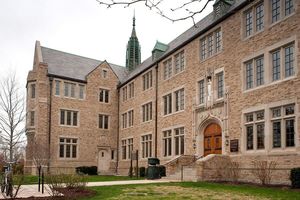 "
"
School and stress are almost interchangeable words for most students — a precarious balancing act of tests, homework, extracurriculars, parties and friends, thrown together with varying degrees of success.
Now, as students complete school work from home, they’re facing new challenges. Students might have to take on the role of caregiver or help out around the house in between online lectures and assignments — a new lifestyle that “can feel overwhelming at times and, while it remains to be seen just how these new pressures will impact a student's performance, they certainly will have an effect,” according to the University Counseling Center staff, which asked to be referred to as a collective group.
The UCC’s goals include providing services to Notre Dame students facing issues ranging from depression or anxiety to general stress. Despite the closed campus, their mission remains. “Student mental health is always top of mind at Notre Dame. This new era is no different,” the UCC staff said.
In response to the pandemic, the UCC has taken advantage of technology, creating many resources for students to access remotely: “Some of them are virtual, others are ways that we can connect with you through online platforms or phone calls.”
One such platform is TAO Self-Help, which the UCC staff described as a collection of “tools and information organized into self-help programs with engaging videos and exercises to help you learn a variety of cognitive-behavioral and mindfulness-based skills.” All Notre Dame students have access to this resource, which can be found on the UCC website. Such technology is being used globally to allow healthcare providers to help their clients from afar.
Additionally, the high availability of self-help applications allow students to address a variety of mental health issues independently. The UCC recommends that students utilize these apps, which are a convenient and effective way to practice self-help.
Yet how effective is self-help?
Even the UCC staff acknowledged that “apps cannot necessarily replace the value of psychotherapy with a mental health professional.” While self-help resources are proven effective for motivated individuals experiencing mild levels of distress, the UCC staff recommended that students with moderate and severe symptoms seek professional support.
These students are encouraged to call the UCC’s new 24/7 HELPLINE, which was set up in response to the pandemic. Any Notre Dame student wishing to speak with a counselor can do so by dialing 574-631-TALK.
All of these services — from self-help to phone consultations — can be found on the UCC website, on pages specifically set up to address mental health during the pandemic. On the “UCC Services During COVID-19” webpage, students can find phone numbers to call for crisis support or consultations; on “Coping During the Pandemic,” a number of self-help tips, apps and other resources are listed; and on “Finding a Community Provider” one will discover ways to connect with health services near them.
Despite their best efforts, the UCC staff faces challenges in offering remote assistance to all students.
Just last week the UCC’s tele-mental health services were made available, offering individual therapy, psychiatric evaluation and medication checks. However, this service is currently only available in Indiana and other select states due to state licensure laws. The UCC staff is working to expand the tele-mental health service as more states change their regulations. Students are encouraged to continue checking the UCC website for updates regarding state access for this resource.
While the UCC has worked hard to make all of these resources available, the staff said that “fewer students are using our services remotely as opposed to when they are on campus.” As awareness of their resources spreads, the staff hopes to connect with more students.
One group of students the UCC hopes to provide for are those facing difficult situations at home.
As the UCC staff explained, “home is not a safe place for everyone.” Issues such as neighborhood or family violence, and addiction or mental health problems can increase distress or cause fear.
“Isolation tends to increase risk in these situations as stress escalates,” the staff said.
In such homes, routine and comfort found in campus life are absent, and academics might not be given priority. The UCC staff encouraged students facing these difficulties to take advantage of their online self-help resources and stress reduction activities, and “to do their best to create time and space each day to focus on what they can and cannot control.”
For these students and others, the UCC recommends utilizing their resources and reaching out to others for support. Staying connected can help mitigate the negative impacts of isolation, such as “fear and anxiety; depression and boredom; anger, frustration or irritability,” the UCC staff said.
“We are encouraging all students to reach out as needed and to lean into the fact that we can all be socially distant and still together.”
Though the UCC staff has worked hard to make sure students stay connected and healthy while scattered across the world, they “look forward to the day when we can be reunited and progress as a community processing this experience together as best we can.”